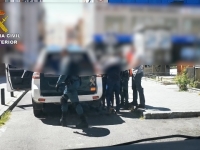Politics
A DAESH supporter who threatened King Felipe was arrested in Madrid
A Guinean man
USPA NEWS -
The Spanish Civil Guard arrested this Thursday in Madrid a 48-year-old Guinean man who was dedicated to publishing on their social network profiles, specifically Twitter, messages with threatening, insulting and / or slanderous content against State Institutions or public personalities, among which included several judges and the Director of the National Intelligence Center (CNI Spanish acronym). Likewise, these messages also included express references to terrorist organizations, specifically DAESH, introducing iconography and representative flags of the same. As a more serious fact, it should be noted that attacks against these personalities were encouraged, including targeting the King of Spain.
The detainee, originally from Guinea-Bissau, without a known job occupation and who had obtained legal residence in Spain, had numerous police records, including various crimes in which violence would have been used, such as robbery with intimidation and injuries, making him a dangerous and unstable individual. The commission of these crimes caused him to be convicted and subsequently entered prison, obtaining freedom in 2015. He was currently systematically failing to confine himself.
According to the Civil Guard, this individual has a great knowledge of the functioning of social networks in general, and of their influence on Spanish society in particular, which is deduced from the inclusion in their messages of hashtag or labels of great popularity in Spain. - television programs, Spanish politicians and State Institutions, among others - with the aim of giving greater visibility to their content.
Anti-terrorist operation
Jihadist terrorist organizations, mainly Daesh, have exploited the current health alert situation, urging their followers and supporters to take advantage of this moment to commit attacks in Europe. For this reason, the Spanish Civil Guard has developed specific research initiatives with the aim of detecting threats associated with this circumstance and preventing these possible actions.
A major anti-terrorist operation by the Civil Guard has now dismantled part of the DAESH propaganda dissemination apparatus, allowing the identification of thousands of users in 133 countries. Antiterrorist service agents from France, Romania, Bulgaria, the Netherlands and the United States, coordinated by the Internet Reference Unit (IRU) of the European Police Agency (EUROPOL), have intervened computer servers located in their respective countries that were used by DAESH to disseminate content.
The international operation now completed was started by specialists from the Civil Guard Information Service in mid-2016, when it detected that numerous people investigated in different operations were consuming propaganda from the different media platforms of DAESH, such as the Al AMAQ Agency or the Al Bayan radio.
The arrest in 2017 in Madrid of an individual of Moroccan origin for his involvement in activities of radicalization and dissemination of jihadist propaganda of the terrorist group DAESH provided the necessary information to identify the core of the infrastructure on the Internet, from which the aforementioned group spread its propaganda, through different websites and social networks.
The complexity and significance of the operation carried out by the Civil Guard is evidenced both by the number of more than one hundred countries involved in the investigation, and by the technical difficulty in extracting and analyzing the data contained in DAESH's computer servers. The expertise of the investigators has led to the involvement of numerous anti-terror services both in Europe and in America, which with this operation have disabled the main DAESH propaganda broadcast networks.
To achieve these results, the role of the Panamanian police and judicial authorities, which facilitated the completion of an International Rogatory Commission, along with specialists from the Civil Guard displaced for this purpose, has been essential. The analysis of the vast information contained in the servers intervened in Panama has allowed helping numerous police services around the world to tighten the siege to the administrators, belonging to the central structure of DAESH, as well as to identify thousands of users located in 133 countries, which consumed this type of propaganda.
This operation has led to the disarticulation of an important part of the DAESH media distribution apparatus and has highlighted the need to maintain international cooperation in the fight against terrorism, especially on the Internet, its preferred means of communication. The use of propaganda, through the Internet and platforms for mobile devices, by the different terrorist groups, constitutes one of its main strengths both for the dissemination of its radical ideology, as well as for attracting new followers and for advertising his actions. Proof of the above are the numerous media production companies that Al Qaeda or DAESH have developed to ensure as large a public as possible.
This international operation significantly reduces the capabilities of the terrorist organization and goes beyond the mere interruption of a content dissemination service. As has been reflected in the recent terrorist actions in Europe, through jihadist propaganda, the objectives that are subsequently attacked by both solitary actors and autonomous cells are captured, indoctrinated, trained and indicated.
Given the situation of loss of territory and material, human and financial potential that the terrorist group is facing on the ground in Syria and Iraq, which is exacerbating its technical shortcomings, the intervention of the servers represents a major blow to the infrastructure that even now it has allowed the group to spread its messages and propaganda. Even more so at a time when DAESH's strategy in the West is focused on inducing autonomous terrorist actions.
From the analysis of the intervened devices, it is expected to identify the individuals who manage the production and dissemination of DAESH propaganda, as well as potentially radicalized individuals residing in western countries, thus configuring the most relevant international anti-terrorist operation in recent years.
Liability for this article lies with the author, who also holds the copyright. Editorial content from USPA may be quoted on other websites as long as the quote comprises no more than 5% of the entire text, is marked as such and the source is named (via hyperlink).






